Lifespan Approach
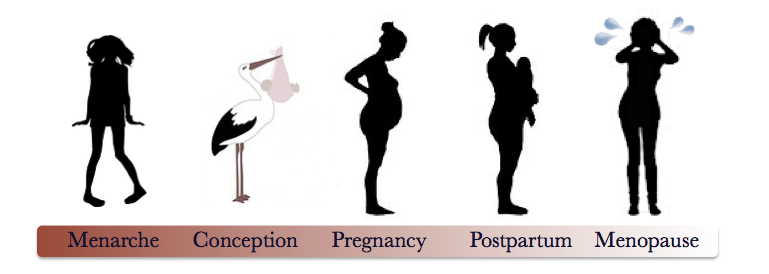
Our mission is to promote women's wellness through education, clinical care, and research that broadens our knowledge of how periods of hormonal fluctuation contribute to cognitive and emotional changes across the female lifespan. Click the links below to learn more about the progression of the female reproductive lifespan and how women can tend to their behavioral wellness at these stages.
Menarche
 Menarche is the term for a girl's first menstrual period. The female menstrual cycle is typically 28 days in length but can vary from 21 to 34 days in length and still be considered "normal." Typical menstruation itself lasts a couple of days to a week. Clinicians are often interested in the age of onset of menarche because, in a minority of cases, menarche may occur unusually early or late. The average age of onset of menarche is 12 years but can range from 8 to 16 years of age. Researchers are particularly interested in menarche because the prevalence of depression and anxiety in females increases at this time. In addition, a subgroup of women will experience clinically meaningful mood changes in the week or two prior to onset of menstrual flow.
Menarche is the term for a girl's first menstrual period. The female menstrual cycle is typically 28 days in length but can vary from 21 to 34 days in length and still be considered "normal." Typical menstruation itself lasts a couple of days to a week. Clinicians are often interested in the age of onset of menarche because, in a minority of cases, menarche may occur unusually early or late. The average age of onset of menarche is 12 years but can range from 8 to 16 years of age. Researchers are particularly interested in menarche because the prevalence of depression and anxiety in females increases at this time. In addition, a subgroup of women will experience clinically meaningful mood changes in the week or two prior to onset of menstrual flow.
Menstruation
Premenstrual Symptoms and Disorders
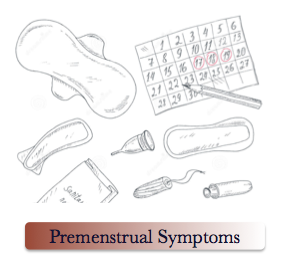 When asked, the vast majority of women will report that they experience "premenstrual syndrome" (PMS). However, what most women mean is that they have some type of relatively mild physical or emotional symptom for several days around the time they get their period.
When asked, the vast majority of women will report that they experience "premenstrual syndrome" (PMS). However, what most women mean is that they have some type of relatively mild physical or emotional symptom for several days around the time they get their period.
Psychological symptoms typically include:
- Irritability
- Mood swings
- Increased sensitivity
Physical symptoms typically include:
- Cramping
- Bloating
- Breast tenderness
- Weight gain
- Appetite changes/cravings
- Fatigue
- Headaches
- Body aches and pains
Clinicians and researchers debate whether having a symptom or symptoms that does/do not interfere with any aspect of daily life should be referred to as a "syndrome," particularly if these symptoms occur in the majority of women. The American College of Obstetrics and Gynecology, the specialty's national professional organization, developed the following criteria or guidelines for gynecologists, mid-wives and other women's health care providers to use when making the diagnosis of PMS. They are as follows:
A symptom or symptoms must be:
- Present in the 5 days before the period, at least 3 menstrual cycles in a row
- End within 4 days after the period starts
- Interfere with some normal activities
If you think you may have PMS, the best step to take is to keep a written record of your symptoms for 2-3 months. Take this information to your doctor. Having a written diary of your symptoms will help your doctor decide whether you have PMS or some other condition. It is important to note whether you feel that your symptoms cause you distress or interfere in any aspect of your daily life, whether it be productivity at work, home or in your relationships with others.
Premenstrual Dysphoric Disorder (PMDD)
Approximately 5% of women experience premenstrual dysphoric disorder (PMDD), a condition that is more severe than premenstrual syndrome (PMS). Women who experience PMDD often experience emotional symptoms that are more severe than routine PMS. These emotional symptoms take place each month prior to the onset of menstruation. Some women may have symptoms that last 7-14 days, while others may find that their symptoms only interfere with daily activities for several days prior to menses. After several days of menstrual flow, women with PMDD feel as if they are back to their normal selves.
Women with PMDD may experience the following symptoms:
- Depression or hopelessness
- Decreased interest or pleasure in usual activities
- Anxiety
- Tearfulness or sadness
- Increased sensitivity
- Feeling overwhelmed
- Irritability
- Loss of energy
- Trouble sleeping or sleeping too much
In addition, women with PMDD make experience the following physical symptoms:
- Cramping
- Bloating
- Breast tenderness
- Weight gain
- Appetite changes/cravings
- Fatigue
- Headaches
- Body aches and pains
In order to meet criteria for PMDD, a woman has to:
- Experience significant symptoms of either low mood or decreased interest or pleasure
- Have a total of 5 symptoms, either psychological or physical
- Have symptoms present during the week prior to menses during most menstrual cycles in the previous year
- Have the symptoms stop before her period is over and not have the symptoms again until the 1 to 2 weeks before her next period
- Have symptoms that cause at least a moderate level of distress or interference in some aspect of daily life
Treating PMDD
What can I do?
Women who experience more mild symptoms each month may benefit from simple changes in their lifestyle. Exercise may reduce stress and help to improve both mood and physical symptoms. In addition, healthy eating habits, along with vitamin supplements, may also help alleviate some symptoms of PMS.
When should I contact my doctor?
You should contact your doctor whenever you have a concern about your health and well-being as they are likely to be the best person to advise you regarding diagnosis and treatment options for PMS or PMDD. While many women with mild to moderate symptoms of PMS may be helped by life-style changes, others with more severe symptoms or those who suffer from PMDD are likely to require medical and/or behavioral treatment in order to experience significant clinical improvement.
Some women benefit from the use of oral contraceptive pills.
Treatment Options
Although exercise, proper nutrition, calcium, and other supplements such as vitamin B6 may help alleviate some of the milder symptoms of PMS that occur, research studies have shown that these strategies do not consistently alleviate the types of symptoms that occur with PMDD. Other pharmacologic treatments are available. Medications known as selective serotonin reuptake inhibitors (SSRIs) are the first-line treatment for PMDD in many countries. The FDA has approved several SSRIs including sertraline (Zoloft®), fluoxetine (Prozac®) and paroxetine (Paxil®) for the treatment of mood and physical symptoms associated with PMDD. The majority of women who take these medications for PMDD experience a meaningful decline in their symptoms. However, PMDD symptoms typically return after discontinuation of the medication. Thus, SSRI treatment is not a cure although it can greatly reduce distressing symptoms and improve overall functioning.
Many women wonder whether oral contraceptive pills (OCPs) can be a treatment for PMDD as these medications keep women from ovulating. Most OCPs cause women to have an even amount of hormones throughout the weeks they take them. Although OCPs keep hormone levels even, they expose the woman to different kinds of estrogens and progestins, some of which may not mimic natural hormones produced by the ovaries. Some women with PMDD notice a worsening of their mood symptoms with OCPs or that the symptoms are present all month instead of just before their period.
Another type of treatment that effects a woman's ovarian hormone production and is effective in the treatment of PMDD is gonadotropin releasing hormone (GnRH) agonist. However, GnRH agonists frequently cause women to experience typical menopause symptoms such as hot flashes, night sweats and vaginal dryness as GnRH agonists dramatically reduce ovarian production of estrogen. However, for the young woman whose PMDD symptoms are not responsive to SSRI treatment, the side effects and risks associated with GnRH agonist treatment may be offset by the potential benefits of symptom reduction and improved quality of life.
No matter what treatment one ultimately chooses, the important thing to remember is that women do not have to experience PMS and PMDD. These symptoms are not "just part of being a woman." If your symptoms prior to your period cause you distress or difficulties in your life, you can feel better. SSRIs are effective, well-tolerated treatments. Make an appointment with your doctor, document your symptoms and bring your symptom diary to discuss with your doctor. If you live in the Philadelphia area, the Penn Center for Women's Behavioral Wellness has clinicians who are trained to evaluate your symptoms and discuss with you the various treatment options. If you meet criteria for one of our on-going research studies, you may qualify for free care, otherwise, customary charges will apply.
Conception
 There are over over 4 million births each year in the United States (US Census Bureau). During the course of a year, approximately 1.5 million women in this age range will meet criteria for clinical depression or anxiety disorder. Many of these women will be using medications to treat their symptoms. Because 50% of pregnancies are unplanned, is it important to understand the potential fetal effects of medications used in the treatment of anxiety and depression. Thus, the best time for women of childbearing age to get information regarding the safety of these medications during pregnancy is before they fill their very first prescription. Some medications such as antidepressants have a relatively good safety profile for use during pregnancy. However, some medications referred to as "mood stabilizers" can cause serious birth defects. It is never an easy decision whether to take a medication during pregnancy, but in many cases the risk of relapse of illness with medication discontinuation is considerable and must be included in the decision-making process. There is a growing concern among researchers and clinicians that untreated mental health problems during pregnancy can have negative effects on the pregnancy and baby's development.
There are over over 4 million births each year in the United States (US Census Bureau). During the course of a year, approximately 1.5 million women in this age range will meet criteria for clinical depression or anxiety disorder. Many of these women will be using medications to treat their symptoms. Because 50% of pregnancies are unplanned, is it important to understand the potential fetal effects of medications used in the treatment of anxiety and depression. Thus, the best time for women of childbearing age to get information regarding the safety of these medications during pregnancy is before they fill their very first prescription. Some medications such as antidepressants have a relatively good safety profile for use during pregnancy. However, some medications referred to as "mood stabilizers" can cause serious birth defects. It is never an easy decision whether to take a medication during pregnancy, but in many cases the risk of relapse of illness with medication discontinuation is considerable and must be included in the decision-making process. There is a growing concern among researchers and clinicians that untreated mental health problems during pregnancy can have negative effects on the pregnancy and baby's development.
The Penn Center for Women's Behavioral Wellness helps women and their partners make these difficult decisions by providing clinical consultations regarding the use of psychotropic medications during pregnancy. Our expert clinicians meet with each woman (ideally including her partner) to review her behavioral health history and to discuss the risks and benefits of using medications during pregnancy. Together with the patient, her healthcare provider and her partner/family member, plans for pregnancy can be made in a careful and thoughtful manner, maximizing benefits minimizing risks.
- NAMI Pregnancy and Depression Fact Sheet
- Massachusetts General Hospital: Psychiatric Disorders During Pregnancy
- FDA: Medication During Pregnancy
Pregnancy
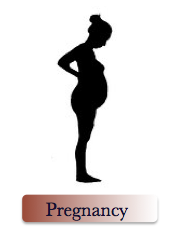 Pregnancy is a time of profound physical and emotional change for women. A woman's body nurtures the developing baby, while her brain is preparing her for the activities associated with motherhood. For some women this is a time of happy anticipation as she looks forward to welcoming the new baby into her life. However even in the happiest of times, women are frequently concerned about what kind of mother they will be. Will they be a "good" mother? Will they know what to do when the baby cries? Will they adjust to having to taking care of helpless infant? How much these types of questions "bother" a woman can vary from not at all to very much. Whether she has a supportive partner and other social supports can make a difference in the expectant woman's sense of well-being during pregnancy and the postpartum period. At the Penn Center for Women's Behavioral Wellness, we recognize that the adjustment to parenthood starts early in pregnancy, if not before conception, and that women benefit from a supportive environment where they can share their concerns and feel safe and understood.
Pregnancy is a time of profound physical and emotional change for women. A woman's body nurtures the developing baby, while her brain is preparing her for the activities associated with motherhood. For some women this is a time of happy anticipation as she looks forward to welcoming the new baby into her life. However even in the happiest of times, women are frequently concerned about what kind of mother they will be. Will they be a "good" mother? Will they know what to do when the baby cries? Will they adjust to having to taking care of helpless infant? How much these types of questions "bother" a woman can vary from not at all to very much. Whether she has a supportive partner and other social supports can make a difference in the expectant woman's sense of well-being during pregnancy and the postpartum period. At the Penn Center for Women's Behavioral Wellness, we recognize that the adjustment to parenthood starts early in pregnancy, if not before conception, and that women benefit from a supportive environment where they can share their concerns and feel safe and understood.
Depression, Anxiety and Stress during Pregnancy
It is normal to feel some degree of concern regarding the health of one's pregnancy and the developing baby. Moreover, it is a "normal" part of everyday life to experience some amount of "stress." Depression and/or anxiety are common responses to chronic or severe stress, particularly when the individual feels that they have few family or social supports. While no one knows how much stress is good or bad, studies suggest that the developing baby can be adversely affected by high levels of maternal stress, anxiety and depression. High levels of stress throughout life can increase a woman's risk for chronic diseases such as metabolic syndrome, high blood pressure and cognitive decline.
The Penn Center for Women's Behavioral Wellness is concerned about the impact of stress on women's well-being across the life span. The Center has several clinical and research programs aimed at helping women through normal transitions in life, such as becoming a mother or "empty-nester" as well as unfortunate times such as during a complicated pregnancy, loss of a family member, or divorce.
Pregnancy Complications and Loss
Women who have suffered from previous pregnancy losses or complications are at particularly high risk for anxiety and post-traumatic stress symptoms (also called post-traumatic stress disorder or PTSD) during future pregnancies. While it is normal to worry about whether the present pregnancy will be a healthy one, the presence of any of the following symptoms are of concern:
- Tension, feeling on edge or jumpy
- Frequent thoughts that something may go wrong with the pregnancy
- Irritability
- Having difficulty getting excited about the pregnancy
- Low mood
- Difficulty sleeping
- Lack of interests in usual activities
- Thoughts that you may be to blame for your previous pregnancy complication or loss \
- Feeling isolated, like no one can understand your worries and concerns
- Worries that you will never have a healthy baby
If you are bothered by any of these symptoms, you're not alone. You may benefit from a consultation or from participating in a research study utilizing a type of talk therapy to help lessen your anxiety and other emotional discomforts. The goal of treatment would be to reduce your symptoms but to also decrease the likelihood that your symptoms will negatively affect your pregnancy and baby's development.
Postpartum
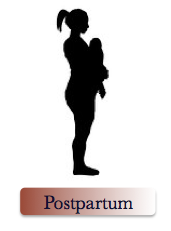 After delivery, most women experience what are called "mood swings." They may feel happy one minute and sad and tearful the next; they may feel overwhelmed or mildly depressed, lack concentration, and find that they cannot sleep well even when the baby is asleep. If you experience these symptoms, you have what is commonly referred to as the "baby blues." The "blues" are considered to be a normal part of early motherhood and are usually resolved by approximately 10 days after delivery. Although the "blues" are thought of as normal, some women will experience more severe or prolonged symptoms of depression, or onset of panic, anxiety or repetitive worries and behaviors which make it more difficult to enjoy their new baby or life in general.
After delivery, most women experience what are called "mood swings." They may feel happy one minute and sad and tearful the next; they may feel overwhelmed or mildly depressed, lack concentration, and find that they cannot sleep well even when the baby is asleep. If you experience these symptoms, you have what is commonly referred to as the "baby blues." The "blues" are considered to be a normal part of early motherhood and are usually resolved by approximately 10 days after delivery. Although the "blues" are thought of as normal, some women will experience more severe or prolonged symptoms of depression, or onset of panic, anxiety or repetitive worries and behaviors which make it more difficult to enjoy their new baby or life in general.
Postpartum Depression
Postpartum depression is more serious than the "baby blues" and occurs in at least 1 out 10 women after delivery. It is not clear why some women get depressed and other don't, but there are biological, psychological and social factors that appear to increase the risk that a woman will experience depression during pregnancy and/or the postpartum period.
Risk factors for postpartum depression include:
- Previous history of depression
- Family history of depression or bipolar disorder
- History of severe PMS or PMDD
- Perception of having insufficient social supports
Here are some of the symptoms of postpartum depression:
- Loss of interest or pleasure in life
- Loss of appetite
- Decreased energy and motivation
- Difficulty sleeping/sleeping too much
- Increased crying or tearfulness
- Feeling worthless, hopeless or overly guilty
- Restlessness, irritability or anxiety
- Unexplained weight gain/loss
- Thoughts of death
- Worries about harming the baby
Many women who are depressed after pregnancy were also depressed during their pregnancy, particularly during the third trimester. It is difficult sometimes to know whether a woman is depressed because many of the symptoms of depression can also be normal for pregnancy and the postpartum period. For example, most women are uncomfortable later in pregnancy and have difficulty sleeping and/or feel tired. In the postpartum period, the baby frequently awakens the mother so that she is tired and more likely to feel overwhelmed and irritable. However, loss of interest or pleasure or low mood are not "normal" for pregnancy and could indicate that a woman is suffering from clinical depression.
Treating Postpartum Depression
Postpartum depression can be treated with talk therapy and/or medication. Women who are having difficulty functioning because of their symptoms should contact their doctor right away to discuss how they feel. Most women with postpartum depression do not become suicidal, however it is not uncommon for women with postpartum depression to have unpleasant thoughts that the may do something to harm their child or children. While these thoughts are upsetting, the vast majority of women do not act upon these thoughts. Women who have made a plan to harm themselves or their child should tell their family immediately and go to the nearest emergency room for a more rapid evaluation. Many women with postpartum depression will also have symptoms of anxiety that may need to be treated with anti-anxiety medication. However, both anxiety and depression are responsive to treatment with a particular type of talk therapy known as cognitive behavior therapy (CBT). During CBT, a woman learns how to identify feelings and thoughts and to understand how the way she thinks leads her to feel depressed, happy, anxious or calm. Typically, a woman begins to feel better after 4-6 sessions of CBT.
No one knows how long an episode of postpartum depression will last if not treated, but research has shown that postpartum depression can have negative effects upon the woman's baby and her family.
Negative effects of postpartum depression on mother and child can include:
- Infant development delays (predominantly cognitive)
- Poor readiness for school
- Childhood depression (if mother's depression persists beyond the postpartum period)
- Martial problems
- Decreased mother-infant bonding
- Decreased maternal self-esteem
- Decreased maternal productivity
Since no one can tell a woman how long she will experience PPD, it is important for her to seek treatment as soon as she begins to question whether she is depressed. Often women are depressed for months, even years, before seeking help. Many new mothers worry that they will be viewed as "weak" or "incompetent" if they ask for help. It takes great strength for a woman to admit to herself that she could use professional help in order to improve. Depression and anxiety are never a sign of weak character, only that the brain is having difficulty functioning at an optimum level. If a pregnant or postpartum woman thought she had a medical problem that could affect her baby, she would never hesitate to seek help. Depression and anxiety which are medical problems related to the brain should receive no less attention than a urinary tract infection or gestational diabetes.
Postpartum Psychosis
Postpartum Psychosis occurs rarely (2 out of 1,000 new mothers) but always requires immediate treatment. Women who are psychotic may begin to think and act in ways that are very unusual for them. They may have strange thoughts that others are planning to harm them, that they have special powers, or that the baby is evil. They may talk very quickly or more than usual, have a decreased need for sleep or food, complain of racing thoughts or appear agitated. When these symptoms occur, a woman needs to see her doctor right away or go to the nearest emergency room. Women with postpartum psychosis are at higher risk for harming themselves and/or their children, thus, emergency care is crucial.
Postpartum OCD and Repetitive Worries or Behaviors
Repetitive Worries and Behaviors can develop during pregnancy and after delivery. Often these worries involve the health and well-being of the infant or cleanliness and order of the household. It is natural for mothers to worry whether their babies are clean, healthy and safe. It is also normal to feel the need to check on the baby a number of times during the day. However, sometimes these concerns and behaviors become excessive and the mother may even worry that she herself may lose control and do something to harm the baby. These thoughts are very frightening and many women may feel too embarrassed or ashamed to admit that they are having them. Most pediatricians, obstetricians and psychiatrists know that these mothers do not want to harm their child and will understand how distressing these thoughts can be.
If you have developed any of these symptoms it is important to remember that this is not something you brought upon yourself, and it does not reflect a personal weakness or an inability to cope. Support groups, individual therapy, behavior therapy and medications, if necessary, are available to help you begin to feel like yourself again.
Menopause
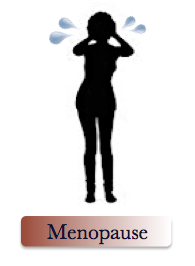 Menopause is a natural event that happens in every woman's life. The average age for menopause in the United States is approximately 52 years, but the menopause transition can last for a number of years. During the menopause transition, women's ovaries produce less and less of the hormone estrogen, until menses stops completely. The loss of estrogen may cause hot flashes, night sweats, insomnia, headaches, irregular periods, and vaginal dryness. In addition, some menopausal women experience moodiness, an inability to concentrate, forgetfulness, trouble being organized and are easily distracted.
Menopause is a natural event that happens in every woman's life. The average age for menopause in the United States is approximately 52 years, but the menopause transition can last for a number of years. During the menopause transition, women's ovaries produce less and less of the hormone estrogen, until menses stops completely. The loss of estrogen may cause hot flashes, night sweats, insomnia, headaches, irregular periods, and vaginal dryness. In addition, some menopausal women experience moodiness, an inability to concentrate, forgetfulness, trouble being organized and are easily distracted.
North American Menopause Society (NAMS): Resources for Women
The Menopause Transition
There are various stages in the menopause transition. Women proceed from being premenopausal to postmenopausal over several years. Some women "go through the menopause" earlier and/or more quickly than others just as some women have bothersome symptoms while others do not. Several large studies of women from across the United States have suggested the following "stages" for the menopause transition.
Premenopause: There is no change in cycle length and a woman can predict when she will get her period.
Early Transition: There is a decrease in predictability regarding when a woman will get her period because her cycle sare no longer the same length each month. Some women may be able to predict their menstrual cycle for several months, but the length of their "usual" cycle has changed by several days.
Late Transition: A woman has experience 2-11 months without a period.
Postmenopause: A woman has not had a period in 12 months.
Many women wonder what is happening to their hormones during the menopause. Each month, from the beginning of puberty until menopause, a woman's ovaries are stimulated by a hormone made in the brain called follicular stimulating hormone (FSH). FSH causes ovarian follicles to enlarge and produce estrogen. Over time, fewer and fewer follicles remain to be stimulated and thus estrogen levels decline as a woman ages. This decline in estrogen leads to an increase in FSH as there is not enough estrogen being produced to "turn off" the brain's production of FSH.
FSH can be used as a measure to indicate whether a woman is peri or postmenopausal. An FSH level of > 30 IU/L is consistent with the perimenopause, although FSH levels of 70-90 IU/L are not uncommon for postmenopausal women. Many gynecologists base their decision about whether someone is peri or postmenopausal on the woman's menstrual history and the presence of common menopausal symptoms.
The FSH test is not considered diagnostic for the menopause. Sometimes women in the early stages of the menopause transition can actually have high estrogen levels because that month the follicles she has remaining in her ovaries were able to responded to the high levels of FSH and produce more estrogen. Thus, the menopause can be characterized by very high and very low levels of estrogen.
Treatments for Menopause Symptoms
Women going through menopause can experience both physical and psychological symptoms relating to the change in hormone levels in the body. Some of these symptoms include:
- Hot flashes
- Mood changes
- Night sweats
- Cold sweats
- Insomnia
- Headaches
- Vaginal dryness
To cope with some of these symptoms of menopause, women may try using the following treatments:
- Hormone therapy
- Antidepressants
- Botanical supplements

